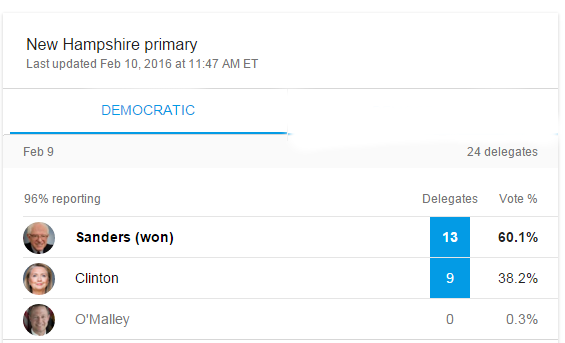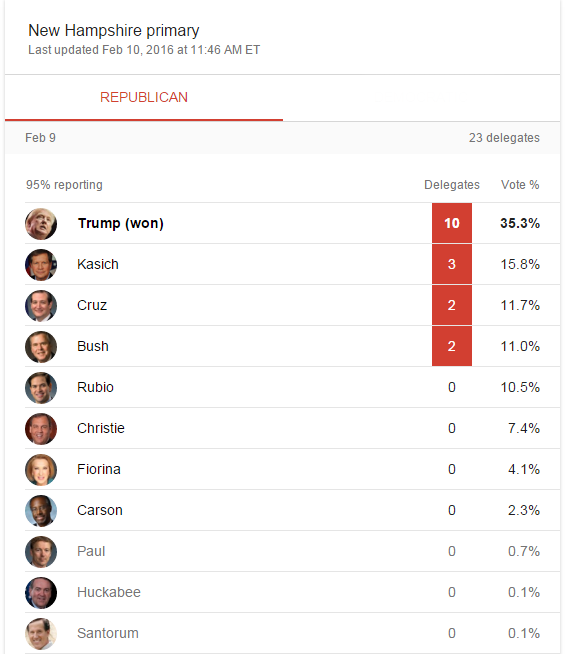First, the results:
The Sanders beat over Clinton was waaay more than expected and the Trump beat over the pack was also more than expected. Meaning…. outsiders are in.
Recognizing that I am painting with a broad brush (which you have to do in these types of analyses), here is how I see it:
The non-establishment demographic comes from two places and goes in two directions. One part of it comes from the right, weened on decades of Fox News and anti-government rhetoric. Initially designed to hurt Democrats (particularly, Bill Clinton) that rhetoric now devours anything viewed as “establishment”, including establishment Republicans (meaning, any Republican senator or governor). These people are primarily Trump supporters.
The second part comes from millennials, people too young to vote when 9/11 happened. And a lot of them. We marvelled at Obama who took the youth vote by 20 points. That’s nothing compared to Sanders, who won the youth vote 85% to Hillary’s 15%.
Unlike the Trump supporters, these people not misinformed so much as naive. They have an idealistic vision of how politics work — it’s all about the vision. These people obviously embrace Sanders’ vision and rage.
Both groups do not care much about experience, elect-ability in the general election, or specific policy details about solutions. They just like the way their outsider candidate sticks it to everybody else.
This is bad news to everybody else in that it boxes them in. The more you attack an outsider, the more insider you appear, which only increases the popularity of the outsider.
The Washington Post, talking about Hillary, nailed this phenomenon, and in two short paragraphs explained Hillary’s problem:
In her concession speech, Clinton tried to get back to a more reform-oriented posture by alluding to the very good campaign finance and voting reform proposals she’s rolled out. But Clinton continued to describe Sanders’s success in limited emotional terms — as if he is merely speaking to people’s anger and frustration. Some pundits similarly describe Trump’s appeal as an ability to harness “anger.” Yet there’s more to it than this. What both Trump and Sanders share is that they treat the problem as one of political economy, in which both the economic and political systems are rigged in intertwined ways, thus speaking directly to people’s understandable intellectual assessment of what is deeply wrong with our system and why it no longer works for them.
The long term danger for Clinton is that Sanders has framed the whole race in a way that will make it very hard for her to counter this argument. If the Democratic establishment steps in to rally for Clinton, that risks making her look more like an old-guard political creature of the very establishment that Sanders is indicting, only now it will be rigging the system on her behalf.
What can Clinton do, when the political system — the one she is without question a part of — is the “bad guy” in the 2016 framework?
Let’s brainstorm:
(1) She can try to reposition her as an outsider
(2) She can try to reposition her opponent as an insider in outsider’s clothes
(3) She can make a case for the “establishment”
Options one and two seem to me impossible. And worse than impossible, disingenuous. Which leaves option three.
What does that mean in terms of political tactics??
No, she does not give a full throated defense of “Wall Street”. But she does poke holes in the myth that everything about Wall Street is bad. Rather than run from Wall Street donations and her speaking fees, she talk about The Clinton Foundation, and the Wall Street donations to that, and what the Clinton Foundation does. It makes a nice contrast to Trump’s millions, which aren’t use for much philanthropy, and Sanders’ rhetoric, which is about as effective in actual change as a bunch of drum circles in Zuccotti Park.
And she releases those speech transcripts.
The point being, if you’re going to be seen as establishment, then defend the establishment. Not so much what it has been, but what it can be. Let’s call in Toby:
That’s my unsolicited advice to Mrs. Clinton. She won’t siphon off the majority of the young vote, which voted in a crazy 85% for Bernie, but she’ll get enough of it. She needs to that – oh, and not take her non-white vote for granted.
As for the Republican nomination, Nate Silver is right. It’s time for the GOP (and the Democrats for the matter) to warm up to the fact that Donald Trump is the front-runner. He’s going to do well in South Carolina. And beyond.
I was right about Kasich coming in second by the way. You would think this would make him viable, but it won’t. His New Hampshire strategy paid off… in New Hampshire. But he has little money, and his victory has no legs. And he doesn’t think Fargo is a funny movie, so… fuck him.
Bush did well, in New Hampshire, and has tons of money. He’s got endorsements (including Sen. Graham of South Carolina), so I think he emerges as the “establishment” candidate for the GOP. Rubio is in for more rough times ahead, with the Bush bashing, and I think his downfall will be more precipitous than many imagine. At some point — maybe a month and a half — I think you have Trump, Cruz, and Bush as the remaining three. Beyond that, I don’t know how it plays out.
UPDATE: Christie is out. Not surprising since he put all his cards down in New Hampshire and came in sixth.
UPDATE #2: Fiorina is out. Even less of a surprise.
Carson should be out. Maybe after SC.
So what we have is essentially a five-man race after New Hampshire: Trump, Cruz, Rubio, Bush, and Kasich. Kasich, as I said above, won’t last long. Rubio might be able weather the storm. But like I said, it will come down to Trump Cruz and Bush.


